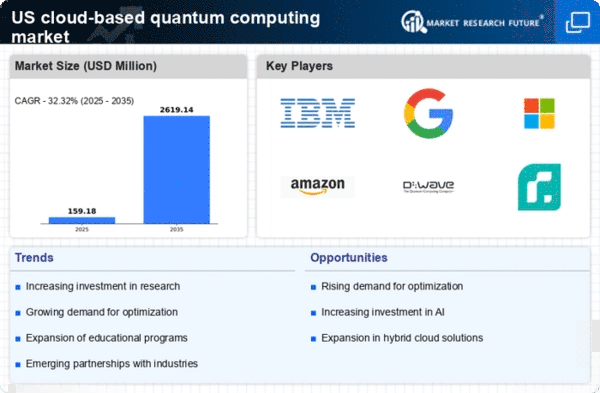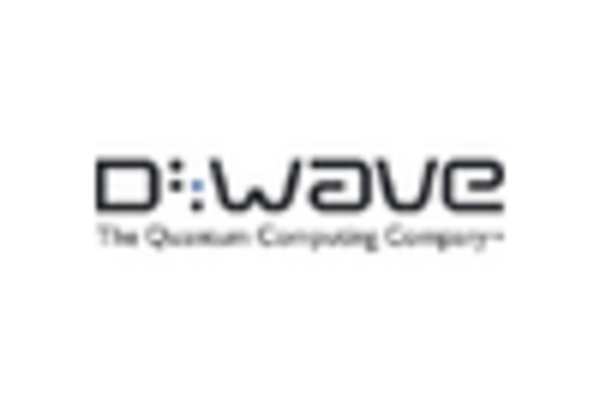Government Initiatives and Funding
Government initiatives play a crucial role in the development of the cloud based-quantum-computing market. In recent years, the US government has allocated substantial funding to quantum research and development, with investments exceeding $1.2 billion in 2025 alone. These initiatives aim to foster innovation and collaboration between public and private sectors, thereby accelerating advancements in quantum technologies. The establishment of national laboratories and partnerships with leading tech companies enhances the research ecosystem, creating a conducive environment for breakthroughs in quantum computing. Such government support is expected to catalyze growth in the cloud based-quantum-computing market, as it encourages startups and established firms to explore new applications and services.
Emergence of Quantum-Ready Workforce
The cloud-based quantum computing market is also benefiting from the emergence of a quantum-ready workforce.. Educational institutions and training programs are increasingly focusing on quantum computing curricula, aiming to equip professionals with the necessary skills to thrive in this evolving field. As of 2025, it is estimated that the demand for quantum computing specialists will grow by over 40%, driven by the need for expertise in developing and implementing quantum solutions. This influx of skilled talent is likely to enhance innovation and drive the adoption of cloud based-quantum-computing technologies across various industries. Consequently, the market is poised for substantial growth as organizations seek to harness the capabilities of quantum computing.
Increased Collaboration Among Tech Giants
The cloud-based quantum computing market is witnessing increased collaboration among major technology companies., which is likely to enhance innovation and accelerate market growth. Partnerships between established firms and startups are becoming more common, as they seek to combine resources and expertise to develop cutting-edge quantum solutions. For example, collaborations between cloud service providers and quantum hardware manufacturers are paving the way for integrated platforms that offer seamless access to quantum computing resources. This trend not only broadens the scope of available services but also reduces entry barriers for businesses looking to adopt quantum technologies. As a result, the cloud based-quantum-computing market is expected to expand significantly in the coming years.
Growing Interest in Quantum Machine Learning
The intersection of quantum computing and machine learning is generating considerable interest within the cloud based-quantum-computing market. Researchers and businesses are exploring how quantum algorithms can enhance machine learning processes, potentially leading to breakthroughs in data analysis and predictive modeling. This interest is reflected in the increasing number of academic publications and industry reports focusing on quantum machine learning applications. Companies are beginning to invest in developing quantum-enhanced machine learning tools, which could revolutionize sectors such as healthcare and marketing. The potential for improved accuracy and efficiency in data processing suggests that the cloud based-quantum-computing market will continue to grow as these technologies mature.
Rising Demand for Advanced Computing Solutions
The cloud-based quantum computing market is experiencing a surge in demand for advanced computing solutions. across various sectors. Industries such as finance, pharmaceuticals, and logistics are increasingly seeking to leverage quantum computing capabilities to solve complex problems that traditional computing cannot efficiently address. For instance, financial institutions are exploring quantum algorithms for risk analysis and portfolio optimization, which could potentially reduce operational costs by up to 30%. This growing interest indicates a robust market potential, as organizations recognize the need for innovative solutions to maintain competitive advantages. As a result, investments in cloud based-quantum-computing technologies are likely to escalate, further driving market growth.

















